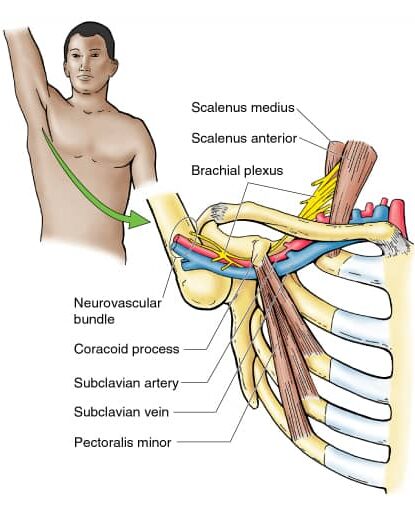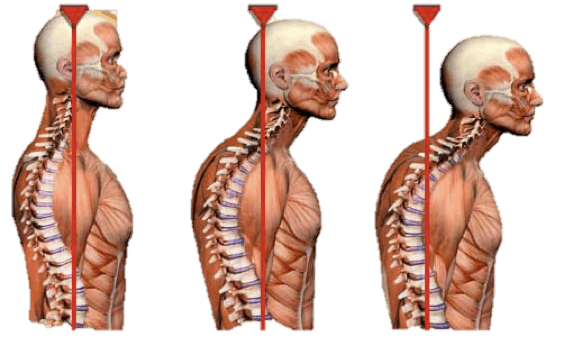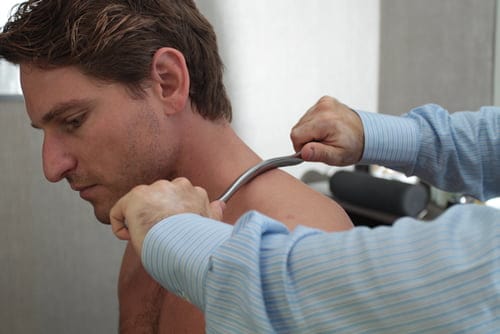**An update on this topic can be found here -> Understanding Thoracic Outlet Syndrome – 5 Treatment Options To Achieve A Breakthrough In Pain, Numbness and Tingling **
Tingling hands, tight muscles and bad posture – the untold story of Thoracic Outlet Syndrome
Are you experiencing numbness or tingling in both hands when you are raising your arms over your head, washing/drying your hair, during prolonged cleaning or overhead activities? You may be experiencing the symptoms of condition called thoracic outlet syndrome. Now you might be asking what that is exactly since it is not a common condition like tennis elbow or carpal tunnel syndrome. This blog aims at shedding light on this often overlooked condition.
What is Thoracic Outlet Syndrome?
Thoracic outlet syndrome or TOS is a process that usually involves the compression or pinching of a bundle of nerves and blood vessels located at the base of the neck and in the shoulder. Compression often happens because of a congenital or acquired change in the bones or soft tissues around this area. Sites of potential compression can happen at the following locations:
-Under or through the scalene triangle
-Between the collar bone (clavicle) and the first rib
-The small pectoral (pectoralis minor) muscle if these muscles are too tight

In 1% of the population and 10% of cases of Thoracic Outlet Syndrome, there is the presence of an extra rib above the others that compresses this bundle. Poor posture such as having head and shoulders forward can also be a contributing factor. TOS can also appear as a result of a shoulder injury (ex: motor vehicle accident) or repetitive overhead activity. The symptoms can be quite vast and it can sometimes be hard to diagnose.
Common Symptoms
Symptoms include:
-Paresthesia (pins and needles or numbness in the fingers and/or hands)
-Feeling of weakness and heaviness in arm
-Cramp-like pain in arm and hand
-Changes in the colour of the hand
-Hands feel cold
-Dull ache or pain in the neck, shoulder or armpit
-Wasting of the muscles in the hand at the base of the thumb (in chronic cases)
Symptoms can vary in terms of how often they occur, length of duration and the amount of compression present.
Treatment options
Now what can you do about it? First of all, the easiest thing that we can work on is maintaining good posture. Keep your head back and shoulders rolled slightly backward and downward. Instantly you will feel like you are standing more upright. This on its own can improve your symptoms greatly.

Physiotherapy is also often recommended to help with Thoracic Outlet Syndrome. This can help with:
-Strengthening muscles of the shoulders
-Correcting your posture (Click to learn more on neck posture)
-Obtaining better range of motion in your shoulder
-Releasing tight muscles that could be compressing the nerves
-Answering any questions or concerns you may have about Thoracic Outlet Syndrome
A physiotherapist can treat this condition by releasing the surrounding soft tissue (manually, with an instrument or a needle), mobilizing adjacent joints, giving you stretches for muscles and nerves as well as education on the condition, posture and how to adapt your daily activities to avoid symptoms.

In some cases, it might be a good idea to ask your doctor about a nerve conduction study in order to see if any of the nervous pathways are affected by Thoracic Outlet Syndrome.
Surgery can also be an option if the problem is longstanding and not responding to any treatment. A conservative treatment is always recommended before any type of drastic measure such as surgery.
Are you worried about your posture? Just another reason to be aware of your positioning, especially for extended periods of time.








